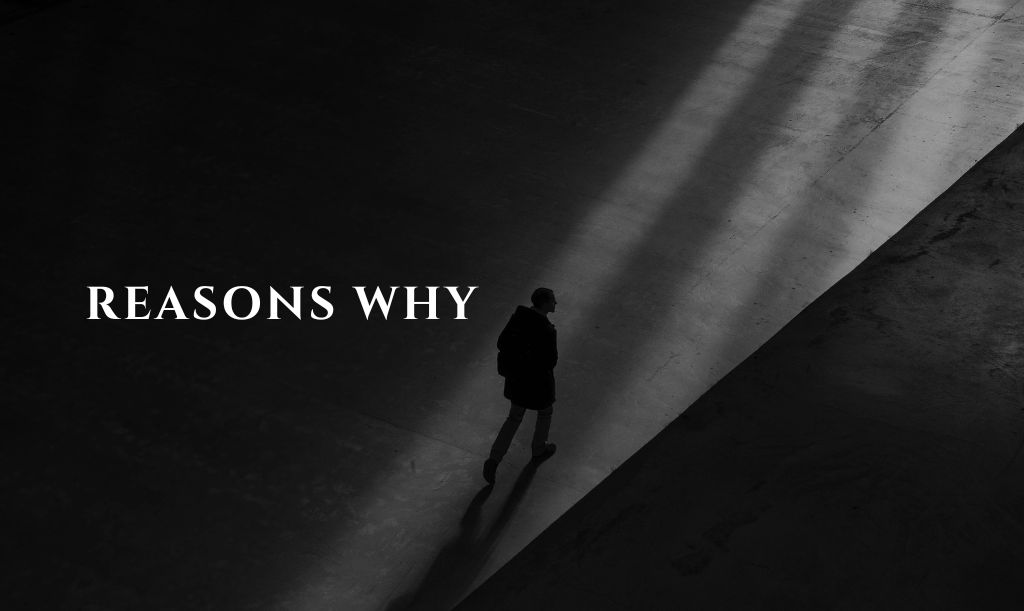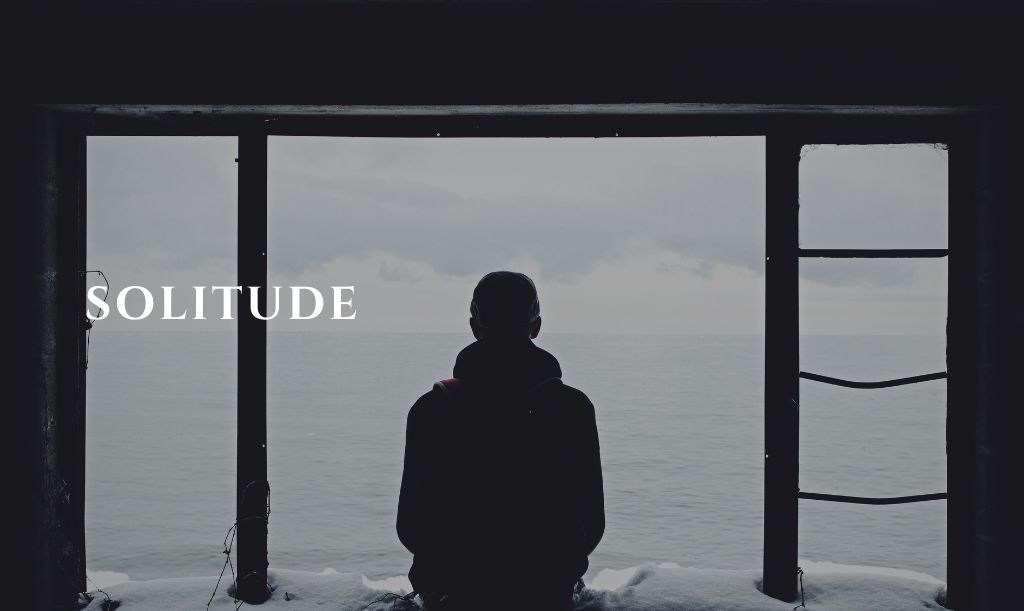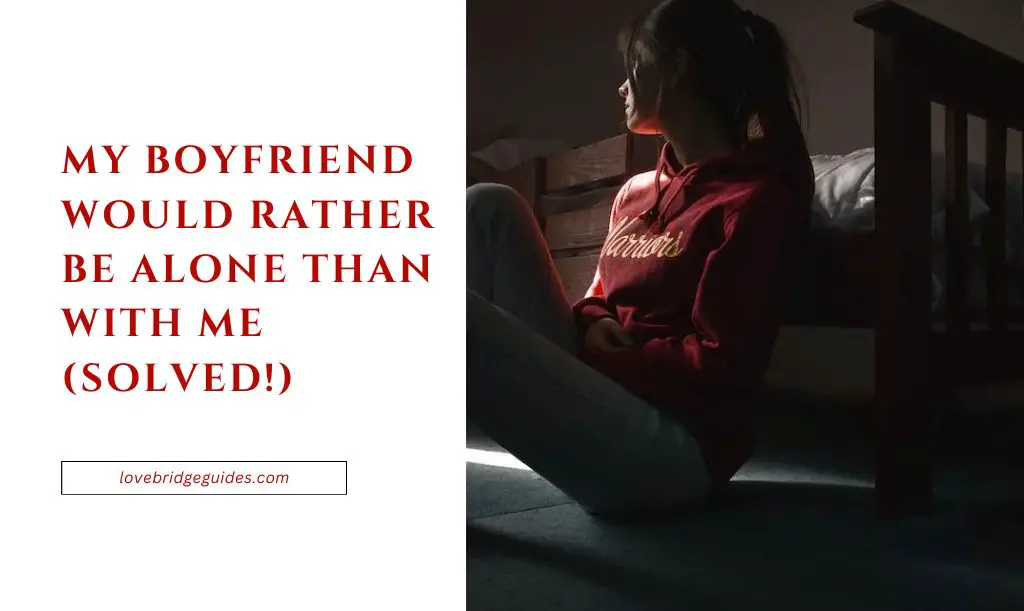‘My boyfriend would rather be alone than with me. What does this mean?’ Find out in this comprehensive article!
One would assume that a couple should always be inseparable, their lives intertwined like ivy on an ancient castle wall.
However, in my case, it seems that my boyfriend would rather be alone than with me.
What could possibly be so captivating in his solitary moments that he prefers them over our shared experiences?
It is indeed a conundrum that begs for exploration, and I shall embark on this quest to unravel the mystery behind his desire for alone time.
My Boyfriend Would Rather Be Alone Than With Me
As I sit here contemplating the enigmatic nature of my boyfriend’s incessant need for solitude, a wave of frustration engulfs me.
How could he possibly prefer his own company over mine? Is there something inherently wrong with our relationship?
These questions relentlessly haunt my mind, leaving me searching for answers.
This perplexing scenario has led me to delve deep into the intricate layers that hide behind his desire for alone time.
In a world that glorifies constant connection and socializing, it is baffling to comprehend how someone can willingly choose loneliness over companionship.
Our society romanticizes the idea of being together, equating it with happiness and fulfillment.
Yet here I am faced with a boyfriend who would rather be alone than with me!
It leaves me feeling rejected, questioning my worth and contribution to our relationship.
Reasons Behind His Desire For Alone Time

To unravel the mystery behind my boyfriend’s longing for solitude, we must peel back the layers of assumptions and societal expectations.
It is essential not to jump to conclusions or make sweeping generalizations about his motives.
Each individual has unique reasons driving their preferences, and it is crucial that we approach this exploration with an open mind.
One possible explanation lies in the notion of personal space and rejuvenation.
Being constantly surrounded by others can be emotionally draining for some individuals, even in the midst of intimate relationships.
The need for solitude allows one to recharge their energy reserves and restore emotional balance.
Perhaps my boyfriend finds solace in these moments where he can focus on self-care without external distractions.
Furthermore, it is essential to consider the impact of introversion on one’s social preferences.
Introverts often thrive in solitude, finding solace and inspiration within their own minds.
While this may not be true for all introverts, it is plausible that my boyfriend’s desire for alone time stems from his innate need to retreat into himself to recharge his mental batteries.
Another layer to be explored is the significance of personal growth and self-discovery.
In a society that places high value on individuality, it is crucial for each person to have space and time to pursue their passions and nurture their personal development.
My boyfriend’s preference for solitude might stem from his desire to explore his own interests, expand his knowledge, or simply spend time indulging in hobbies he finds fulfilling.
Understanding the reasons behind my boyfriend’s inclination towards solitude requires us to acknowledge that there are numerous factors at play.
It is not a reflection of our relationship’s health or my worth as a partner.
By approaching this topic with empathy and open-mindedness, we can cultivate an environment of understanding and respect within our relationship.
Understanding Solitude and Its Significance
Solitude, my dear readers, is not to be confused with loneliness.
No, solitude is the art of finding solace in your own presence, reveling in the tranquility that comes from being alone with your thoughts.
It is a state of being that allows for introspection and self-discovery, free from the distractions and influences of others.
In a world constantly buzzing with noise and demands, embracing solitude provides an opportunity to recharge our weary souls and foster a deeper understanding of ourselves.
Stoicism and self-reflection: The wisdom derived from introspection
The ancient philosophy of Stoicism propagated by wise men such as Marcus Aurelius teaches us that introspection in moments of solitude can lead to profound insights into our lives.
By embracing silence and retreating into ourselves, we gain clarity amidst chaos. In these quiet moments devoid of external distractions, we can reflect on our thoughts, actions, desires, strengths, weaknesses—the very fabric that makes us who we are.
Thoreau’s Walden Pond Experiment: Discovering Oneself In Seclusion
Thoreau’s experiment at Walden Pond serves as a testament to the transformative power of solitude.
In that rustic cabin by the water’s edge, surrounded by nature’s embrace, Thoreau dared to strip away the trappings of society and immerse himself in the simplicity of existence.
Through this immersion, he discovered truths about himself and humanity that continue to resonate with us today.
It was in solitude that Thoreau found the freedom to live deliberately, to distill life’s essence and discover his own purpose.
Solitude, my friends, is not a mere indulgence; it is a sacred space where we can unmask our true selves and cultivate a deeper connection with our inner being.
So, let us not dismiss or resent those who seek solace in their own company but recognize their yearning for self-discovery and personal growth.
The Psychology of Solitude

Ah, the eternal battle between introverts and extroverts.
These two diametrically opposed personality types shape the way individuals interact with the world, ultimately influencing their social preferences.
Introverts, those mysterious beings who find solace in solitude, cherish their inner sanctums and draw energy from within.
They thrive in introspection and require ample time alone to recharge their depleted social batteries.
On the other end of the spectrum, we have extroverts—a vibrant breed that revels in social engagement and absorbs energy from external stimuli like a sponge.
They flourish amidst lively conversations, buzzing crowds, and constant interaction.
Carl Jung’s Theories On Introversion And Extroversion Archetypes
Enter Carl Gustav Jung, the Swiss psychiatrist who pioneered our understanding of these contrasting personalities with his groundbreaking theories on introversion and extroversion archetypes.
According to Jung’s revolutionary insights, introverted individuals tend to focus more on internal thoughts and feelings rather than external events.
They often possess a rich inner world brimming with intricate ideas and emotions that may not always be easily shared or expressed in group settings.
Extroverts, on the other hand, find themselves at home amidst external stimuli—connecting passionately with others around them and thriving in dynamic environments.
Myers-Briggs Type Indicator (MBTI): Analyzing personality types and their inclination towards solitude
But wait!
If you thought Jung’s work was fascinating enough, let me introduce you to the Myers-Briggs Type Indicator (MBTI).
This psychological assessment tool delves even deeper into our personalities by categorizing individuals into sixteen distinct types based on four key dimensions: extraversion (E) vs introversion (I), sensing (S) vs intuition (N), thinking (T) vs feeling (F), and judging (J) vs perceiving (P). When it comes to solitude, the MBTI sheds light on how different personality types gravitate towards or away from alone time.
For instance, INTPs—those enigmatic intellectuals—often find themselves in a state of bliss when left alone to explore the realms of their mind, while ESFPs—the life of every party—thrive in social situations and may feel a sense of unease when confronted with extended periods of solitude.
Intriguing as it may be, understanding these psychological frameworks can help us grasp why your boyfriend may have an inclination towards spending time alone.
So let’s delve even deeper into the complex maze that is the human psyche. Keep reading for more enlightening insights!
Seeking Balance in Relationships
In the intricate tapestry of relationships, there exists a delicate dance between togetherness and individuality.
It is a constant tug-of-war where partners strive to find the perfect balance between being united as one and preserving their unique identities.
While it might be disheartening to witness your boyfriend’s preference for alone time, it is crucial to understand that this inclination does not reflect his lack of love or affection towards you.
Rather, it is an innate need for personal space that allows individuals to flourish on their own terms.
Attachment Theory: Understanding Different Attachment Styles in Relationships
Attachment theory sheds light on the diverse ways individuals form emotional bonds within relationships. Two common attachment styles are anxious attachment and avoidant attachment.
Anxious attachers crave constant reassurance, fearing abandonment and seeking excessive closeness.
On the other hand, avoidant attachers value independence, often keeping emotional distance and seeking solitude as a protective mechanism.
These attachment styles significantly impact preferences for alone time.
Anxiously attached individuals may interpret their partner’s need for solitude as rejection or indifference, while avoidantly attached individuals may perceive alone time as essential for self-preservation.
Benefits of Maintaining Personal Space Within a Relationship
The idea of personal space might seem counterintuitive within a relationship built on unity and shared experiences.
However, nurturing personal growth and self-discovery through alone time can greatly benefit both partners involved.
Personal space offers an opportunity for introspection, allowing individuals to delve deep into their thoughts and desires without external influences.
Engaging in activities that bring fulfillment outside the relationship fosters self-esteem, confidence, and a sense of fulfillment that ultimately strengthens the bond.
By supporting each other’s quests for independence, partners can cultivate a relationship grounded in mutual respect, understanding, and personal evolution.
Navigating the delicate balance between togetherness and individuality is paramount in any relationship.
Understanding attachment styles helps shed light on the preferences for alone time within a partnership.
Embracing personal space as a means of self-discovery and growth nurtures both individuals’ needs and ultimately strengthens the bond they share.
Remember that your boyfriend’s desire for solitude is not a reflection of his feelings towards you but rather an innate need to nourish his own identity.
Embrace it as an opportunity for growth, both individually and as a couple, and let your love flourish alongside each other’s blossoming selves.
Potential Reasons Why My Boyfriend Would Rather Be Alone Than With Me
Self-care is a buzzword that seems to be on everyone’s lips these days.
But have we truly delved into its essence?
The truth is that solitude serves as a sacred ritual of self-care for many individuals.
It is during these moments of seclusion that one can truly nourish their soul, replenish their energy, and find solace in the tranquility of their own thoughts.
Perhaps my boyfriend has recognized the significance of self-care and uses his alone time to engage in activities that bring him joy and rejuvenation.
Whether it’s reading a book, pursuing a hobby, or simply basking in the silence, let us not dismiss the beauty and necessity of this introspective practice.
My Boyfriend Would Rather Be Alone Than With Me: Conclusion
Dear reader, let us not hastily jump to conclusions when faced with our partners’ desire for alone time.
Instead of viewing it as an insult or rejection, let us embrace the multifaceted nature of relationships.
Understand that nurturing personal space within a relationship is not only healthy but crucial for individual growth and happiness.
Remember that even amidst moments of solitude, love can thrive and flourish.
So rather than harboring resentments or insecurities when your partner seeks solitude over togetherness, rejoice in the opportunity for both you and your beloved to cultivate your individual selves.
Embrace this dance between intimacy and independence – for it is through balance that true love blooms beautifully.
Related Articles:
- https://lovebridgeguides.com/i-need-you-meaning-in-a-relationship/
- https://lovebridgeguides.com/when-a-guy-uses-we-instead-of-i/
- Does A Prom Date Mean Anything? (Answered!) - 20 February 2024
- Boyfriend Refers To Me In Third Person (Explained!) - 20 February 2024
- Is Sending Memes Flirting? Find Out Here! - 20 February 2024

